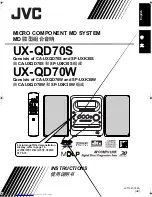
Getting Started
Connecting to Audio-Visual Components
4
to LINE OUT
(T
ape Deck)
to LINE IN (
T
ape Deck )
R
L
CD
IN
IN
OUT
SAT IN
DVD IN
IN
OUT
TV IN
DIGITAL
S-VIDEO
TAPE
VCR
L
R
AUDIO
VIDEO
OUT
TO TV
TV
CD
DVD
SAT
1
2
CD
DVD
SAT
COAXIAL
DVD IN
SAT IN
OUT TO TV
VIDEO
AUDIO
DIGITAL INPUTS
Connect components
capable of outputing
Dolby Digital (e.g. DVD
or SAT) or standard
PCM (CD) format digital
signals. Read section
on "Input Signal Setting"
under "Advanced Sound
Control" (refer to pg 20)
carefully to adjust the
matching input settings.
CD Player
TV
VCR
SAT
Tape Deck
DVD
DIGITAL CONNECTION
If you have a SAT receiver DVD player or CD player with a digital output, you can make use of an optical digital cable
(not supplied) or coaxial digital cable (not supplied) to carry the audio portion of the signal and enjoy Dolby Digital sound
quality. One optical or coaxial cable is needed for each SAT receiver, DVD player or CD player. When optical or coaxial
cable is used, the analog audio cables are still needed if recording through a tape or VCR is desired. This receiver
provides 2 optical and 1 coaxial digital input for the connection of your components. Connect your components (e.g.
DVD, SAT or CD) to the appropriate digital inputs and refer to the "Input Signal Setting" section on page 20 to select the
corresponding digital input source.
Note: Optical and coax cables carry only the audio portion of the signal. A video connection must also be established for
a SAT receiver and DVD player. S-video provides the best connection for the video portion of the signal. Composite video
(yellow RCA connector) can also be used. It is important that the same type of cable (S-video or composite) that is
connected from the Home Theatre to the TV is used to connect the SAT receiver or DVD player to the Home Theatre.
If your CD player is equipped with digital optical jacks,
use of optical cable is preferred. What you need is just
one more digital optical cable (not supplied). Plug it in
the digital input jack of the receiver and select
OPTICAL 1 or 2 on the receiver setting (see details on
pg 20 chapter "Input Signal Setting"). You can enjoy
better sound quality brought to you by the optical
cable. When optical cable is used, analog cables are
still needed for recording to tape / VCR output.
S-VIDEO
If your video component has a S-Video jack included, you
can make use of it to enjoy enhanced video quality by
connecting it to the relevant S-Video jack at the rear side
of the receiver. One S-video cable is needed for each
component. When S-Video cable is used, composite
video (yellow RCA connector) cable must also be
connected for VCR recording.
Note: Before plugging in the optical cable or S-Video
cable, make sure to match the shape of the plug and jack,
otherwise, you will not be able to plug in completely.
to AUDIO OUT (TV)
to VIDEO IN (TV)
to S-VIDEO IN (TV)
to VIDEO OUT
(SA
T)
to
AUDIO OUT
(SA
T)
to S-VIDEO OUT (SAT)
to
AUDIO OUT
(VCR)
to VIDEO OUT
(VCR)
to VIDEO IN (VCR)
to
AUDIO IN (VCR)
to
AUDIO OUT
(CD)
to S-VIDEO OUT
(DVD)
to
AUDIO OUT
(DVD)
to VIDEO OUT
(DVD)
DPL680 EN 4/8/04 4:00 PM Page 8








































